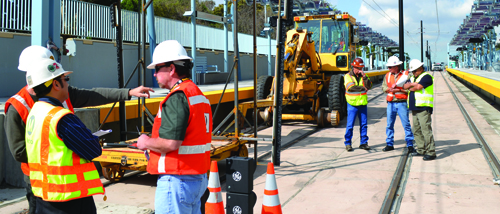House transportation appropriations bill repudiates administration effort to eliminate transit funding

The House took their first step toward approving a transportation funding bill for the next fiscal year (FY20), and it contains mostly good news for transportation, as well as another repudiation of the administration’s attempts to eliminate funds for expanding and improving transit.

The annual Transportation Housing and Urban Development appropriations bill—known as T-HUD—was released yesterday and approved this morning by the House Committee on Appropriations THUD subcommittee. The annual spending bill contains good news for transportation with some programs receiving an increase in funding over last year. It provides solid funding for the transit Capital Investment Grants (CIG) program and the competitive Better Utilizing Investments to Leverage Development (BUILD) grant program. The bill also allocates new resources for research into emerging technologies and prioritizes assistance for vulnerable populations.
T4America worked with Members of Congress to secure a number of policy objectives in this bill, including several important improvements to the BUILD program, changes to the transit capital (CIG) program to encourage FTA to get projects moving, and continued robust funding for several passenger rail programs. T4America members can read a detailed summary below:
[member_content]This member-exclusive memo describes the full details in the Transportation, Housing and Urban Development (THUD) FY 2020 appropriations bill approved by subcommittee. [/member_content]
Transit
The bill rejects the administration’s proposed cut of more than $1 billion and provides the FAST Act authorized level of $2.3 billion for the transit capital program (CIG)— which provides funding for local communities to build major new public transit projects or expand existing service. While this represents a $251 million decrease compared to the amount allocated in 2019, it’s sufficient to meet the obligations to existing projects while also advancing new projects.
The biggest news on this front is that the bill again requires the Federal Transit Administration (FTA) to obligate 80 percent of the allocated funds by the end of the following calendar year (2021) with an aim to force the FTA to advance the deserving projects waiting in the pipeline. Our Stuck in the Station tracker has chronicled how the Trump administration has been slow to spend appropriated dollars through this program. The bill also goes a step further by requiring any unobligated funds (after the 2021 deadline) to be immediately awarded to projects in the pipeline, an effort to prevent the FTA from simply sitting on the money.
The bill also provides $10.8 billion to transit formula programs as authorized by the FAST Act, including funding for bus and bus facilities, no- and low-emission buses, and new competitive grants to assist transit programs in areas of persistent poverty.
BUILD/TIGER
The House bill directs $1 billion to the BUILD program (formerly known as TIGER grant program). As we’ve chronicled, the U.S. Department of Transportation has effectively turned this formerly innovative program, created to advance complex, hard-to-fund projects, into little more than a rural roads program, dramatically undercutting both its intent and utility. The important news here is that several of the reforms T4America proposed for BUILD were included in this House bill:
- Setting aside $15 million for planning grants and requiring the Secretary to award planning grants with an emphasis on transit, transit-oriented development, and multi-modal projects;
- Doubling the maximum award to $50 million;
- Considering the benefits of a project beyond its physical location in an urban or rural area to the fullest extent to include all relevant geographic areas.
In addition, the House bill also sets aside $20 million within BUILD for the planning, preparation or design of projects in areas of persistent poverty.
Passenger rail
The House bill continues to provide support for many important programs which fund existing and expanded passenger rail service. Funding for Amtrak’s Northeast Corridor increased by $50 million over FY19 while the national network is funded at $1.291 billion, the same level as FY19.
The news was mixed for the two programs that provide the bulk of competitive capital grants and operating support to improve service, upgrade old equipment, and grow passenger rail service nationwide. The Consolidated Rail Infrastructure and Safety Improvement (CRISI) Grants Program is funded at $350 million, $20 million more than the FAST Act authorized level, and includes a new set aside ($55 million) for “the acquisition of rights of-way, track, or track structure” to support the development of new intercity passenger rail service routes. Unfortunately, the bill doesn’t provide any funding for the Restoration and Enhancement Grants (R&E) program, which was authorized to receive $20 million each each under the FAST Act. We’re hoping the Senate bill will recognize the importance of these programs and provide funding to the R&E program.
What’s next for 2020 appropriations?
With the subcommittee markup wrapped up now, it is expected to be considered by the full Appropriations Committee in the coming weeks and then the full House by the end of June. The Senate has yet to introduce its version of this bill, but we expect that to happen sometime in the next few weeks. T4America will continue keeping a close watch as the critical annual FY20 spending bill progresses.
Key programs
In millions of dollars
| Funds by program | FY18 enacted | FY19 enacted | President’s FY20 budget | House FY20 appropriations |
| Formula funds (Mass Transit Account) | $9,733 | $9,900 | $9,940 | $10,800 |
| Capital Investment Grants | $2,600 | $2,552 | $1,046 | $2,301 |
| BUILD (formerly TIGER) | $1,500 | $900 | $0 | $1,000 |
| Amtrak (Northeast Corridor) | $650 | $650 | $200 | $700 |
| Amtrak (national network) | $1,292 | $1,291 | $538 | $1,291 |
| Federal-State Partnership for State of Good Repair | $250 | $400 | $0 | $350 |
| Consolidated Rail Infrastructure & Safety Improvement Grants | $593 | $255 | $0 | $350 |
| Restoration & Enhancement Grants | $20 | $5 | $0 | $0 |



